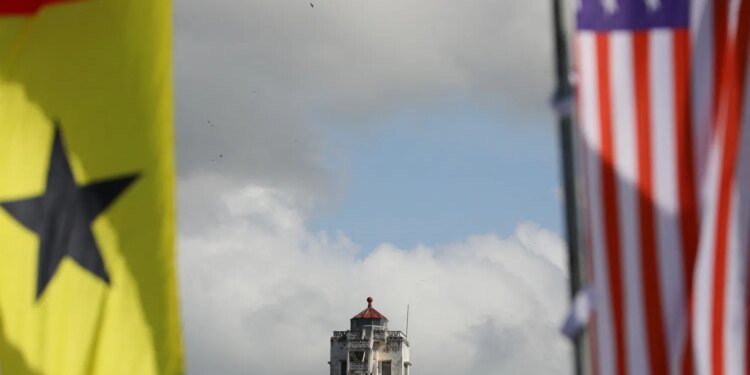
A bipartisan group of U.S. House lawmakers is pushing to reauthorize a foreign aid bill aimed at stemming the tide of state failure and coups, particularly in Africa, by preventing them before they start—even though Congress has criticized how the Biden administration has used the law.
A bipartisan group of U.S. House lawmakers is pushing to reauthorize a foreign aid bill aimed at stemming the tide of state failure and coups, particularly in Africa, by preventing them before they start—even though Congress has criticized how the Biden administration has used the law.
The Global Fragility Act (GFA), first passed under the Trump administration, was built as a sort of early-intervention program for backsliding and failing states around the world. The goal was to break down barriers between different pots of U.S. foreign assistance that had been effectively siloed from one another and to unify them into a cohesive effort to stabilize at-risk countries.
“The whole point of the [GFA] is to learn the lessons from the Sahel, from Iraq and Afghanistan, from how we’ve engaged in other places like Somalia and say that clearly, as good as the intentions were, it didn’t work,” said Rep. Sara Jacobs, the ranking member of the House Foreign Affairs Subcommittee on Africa. The program, she said, is about showing a “different, adaptable, whole-of-government approach.”
But lawmakers and experts have criticized the program’s implementation. Foreign Policy previously reported that Congress had objected to the Biden administration’s plans to launch pilot programs for the GFA in Libya and Haiti in 2022, fearing that both countries were already too unstable.
Congress is not seeking to change the countries involved in the program in its second five-year round. In addition to Haiti and Libya, five countries on the West African coast—Benin, Ghana, Guinea, Ivory Coast, and Togo—were part of the first pilot program, as well as Mozambique and Papua New Guinea. The U.S. Agency for International Development, in particular, has sought to focus on Benin, Togo, and northern Ghana, trying to train local leaders to counter extremism.
Instead, Jacobs and Republican Rep. John James, who co-sponsored the reauthorization bill, want to increase monitoring of the programs and allow a U.S. interagency steering panel to take an annual look at how the law is being implemented.
The reauthorization push comes as the U.S. Defense Department is increasingly eyeing putting troops and assets into friendly countries in West Africa—such as Benin, Ghana, and Ivory Coast—to cooperate with their governments on counterterrorism and stabilization efforts, especially following the U.S. military’s departure from Niger this summer after the country’s pro-Western president was overthrown last year.
“It makes sense that the U.S. is repositioning towards the coast. The conflict is still in a preventable stage there, whereas in the central Sahel, things have gotten past the prevention stage,” said Franklin Nossiter, the International Crisis Group’s Sahel researcher. “But cutting ties with the central Sahel both for the U.S. and for the countries on the coast which have difficult relations with their northern neighbors, that’s a fool’s game.”
The Wall Street Journal reported this month that the new U.S. counterterrorism strategy for Africa is likely to hinge on the Pentagon renovating an airfield in Benin to deploy U.S. helicopters, adding special forces in Ivory Coast, and haggling over the return of U.S. special forces into Chad.
In Niger, “all of our eggs were in one basket for a little bit there,” a Democratic congressional aide told Foreign Policy, speaking on condition of anonymity to talk about the ongoing planning. “The department is trying to look to spread the assets and not just rely on one country.”
But even as Capitol Hill and the Biden administration have touted the GFA as a way to help stifle al Qaeda’s and the Islamic State’s expansion in Africa, congressional aides have continued to complain that the program’s implementation has been too slow and that the Biden administration has not requested the full $200 million that the program is capped out at.
“I will say, I don’t think anyone thinks it’s going as quickly as we would want,” Jacobs said. “Obviously, it took a long time for them to pick countries and then to spin up the strategy. But I do think we’re starting to really see it get into its groove.”
But with al Qaeda-linked groups continuing to carrying out violent activities in the region—including Jamaat Nusrat al-Islam wal-Muslimin staging its first attack in the Malian capital of Bamako in years on Tuesday—experts are warning that the United States has to get back in the game in the region to stem the flow of terrorism.
“The U.S. has to do something in the Sahel,” said Joshua Meservey, an Africa expert at the Hudson Institute in Washington. “The GFA hasn’t seemed to provide many results so far, but the core of the strategy is correct. What choice does the U.S. have other than to try to operate in especially the north of these littoral countries and keep what’s happening in Mali, Burkina Faso, and Niger from spreading south?”
“The reality of those three countries [is]: There’s no end in sight here,” Meservey added.










